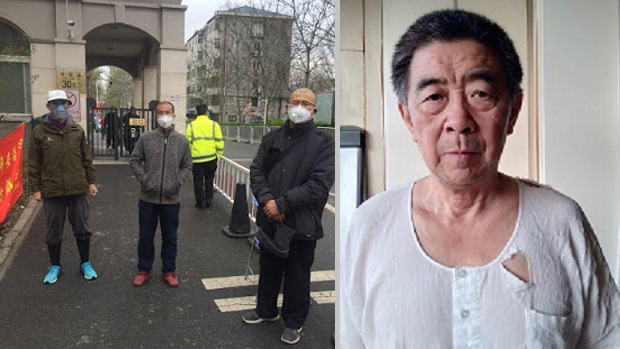
Authorities in the Chinese capital have formally arrested a retired professor who called COVID-19 a “Chinese Communist Party (CCP) virus,” as supporters of the ruling party unleash a political backlash against its critics and the authorities investigate supporters of Wuhan Diary author Fang Fang.
Beijing police formally arrested Chen Zhaozhi on April 14 for “picking quarrels and stirring up trouble,” a charge frequently used to target peaceful critics of the regime, after he made comments linking the coronavirus to the CCP.
Chen, a former professor at the Beijing University of Science and Technology, had weighed in on a raging online debate about the origin of the coronavirus pandemic by saying it should be described as a “Chinese Communist Party virus” rather than a Chinese virus.
Chen, 68, told his lawyer during their first meeting on April 24 that police had tried to force him to confess but he refused to do so, according to the overseas based Chinese Human Rights Defenders (CHRD) network.
Chen, who is currently being held at the Haidian Detention Center in Beijing, has high blood-pressure and has previously suffered a stroke, sparking concerns about his health, especially if he becomes infected with the coronavirus himself.
He also suffers from dementia, adding to concerns for his well-being.
Beijing resident Ma Xinli, who has been trying to find out more about Chen’s case, said he was initially called in for questioning at the Haidian police station on April 10.
“According to his [ex-]wife, the police came to his home before they detained him and checked the contents of his cell phone,” Ma said. “After they detained him, they took his computer away as well.”
‘A very sensitive topic’
Ma said Chen’s detention was “very likely” linked to his remarks about the coronavirus.
“The Wuhan pneumonia is a very sensitive topic right now, so it’s risky to post or repost anything relating to it,” he said.
Ma said Chen was diagnosed with dementia on a recent trip to hospital.
“It was the police who took him there, so they know about it,” he said. “He shouldn’t be detained at all.”
Chen’s lawyer Ma Gangquan said Chen was refusing to “confess,” which didn’t bode well for him, as he was already being watched by police after shouting “Down with Li Peng!” outside Beijing’s Babaoshan crematorium last year, on the day of the former premier’s funeral.
“He won’t plead guilty, because he thinks that what he wrote online should come under freedom of expression, and was therefore legal,” Ma Gangquan said. “This is purely an act of revenge by the police department.”
Nationwide backlash
Chen’s arrest comes amid a nationwide backlash, both online and by law enforcement, against anyone criticizing China’s handling of the coronavirus epidemic after it emerged in Wuhan.
Liang Yanping, a professor at Hubei University, is currently under investigation by the authorities, and has been targeted by a deluge of hate speech and threats online since she spoke out in support of Fang Fang, who authored the mildly critical Wuhan Diary when the city was under lockdown.
“Little pink” CCP supporters and paid “50-cent army” commentators have also targeted retired Hainan University professor and acclaimed poet Wang Xiaoni for a torrent of online abuse.
Guo Yuhua, sociology professor at Beijing’s prestigious Tsinghua University, said there appears to be a renewed nationwide political campaign targeting outspoken academics and intellectuals under way.
“This is happening in colleges and universities,” Guo said. “It’s not, I think, just about restricting speech, but also about the targeted elimination of people who express dissenting views.”
“They are targeting anyone who expresses their support … for Fang Fang,” she said.
She said those targeting Fang Fang and her supporters, many of whom are older women from a literary background, lack the ability to think critically.
“I don’t know them, but they behave in such a disgusting way, like they can’t tell right from wrong,” Guo said. “They don’t have minds of their own, or any capacity for independent thought; I actually pity them.”
Online comments likened the online witch-hunt to the chaotic and arbitrary political campaigns and struggle sessions of the Cultural Revolution (1966-1976).
Intimidation, harassment
Meanwhile, authorities in the central province of Hubei have intimidated and harassed potential litigants
“Chinese police intimidated and harassed potential plaintiffs in litigation against Wuhan and Hubei governments for failure to release vital information about the novel coronavirus in a timely manner, which resulted in deaths and damage,” CHRD said in a statement on its website.
“Authorities pressured victims and families to abandon efforts to seek legal consul online, give media interviews, or contact lawyers offering legal aid,” it said.
By April 22, at least six families who lost loved ones to the virus and one woman who recovered from it were forced to abandon lawsuits “under intense threats and harassment,” the group said.
Meanwhile, an internal Chinese report has warned that Beijing faces a rising wave of hostility in the wake of the coronavirus outbreak that could tip relations with the United States into confrontation, according to Reuters.
The report, presented early last month by the Ministry of State Security to top Beijing leaders including President Xi Jinping, concluded that global anti-China sentiment is at its highest since the 1989 Tiananmen Square crackdown.
The Chinese foreign ministry declined to comment when contacted by Reuters.
Reported by Wong Lok-to for RFA’s Cantonese Service, and by Gao Feng for the Mandarin Service. Translated and edited by Luisetta Mudie.
Source: Copyright © 1998-2016, RFA. Used with the permission of Radio Free Asia, 2025 M St. NW, Suite 300, Washington DC 20036. https://www.rfa.org.












